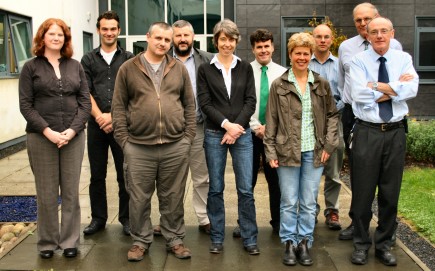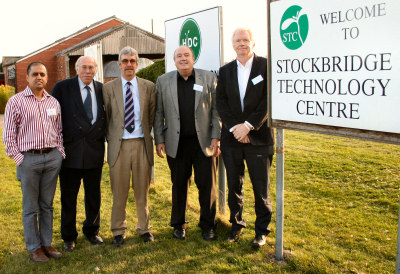Latest News
2nd January - What part are the Demonstration Test Catchments playing in addressing water pollution?
11th December - Demonstrating Test Catchments 2013 Conference
10th December - Top tips for farmers in agricultural calendar
Warning: Undefined property: pagination::$paging in /export/depts/iens/lec/sites/catchmentchange/wp-content/themes/CCN/category-1.php on line 26
Warning: Undefined array key "" in /export/depts/iens/lec/sites/catchmentchange/wp-content/themes/CCN/category-1.php on line 26
Warning: Undefined property: pagination::$nextT in /export/depts/iens/lec/sites/catchmentchange/wp-content/themes/CCN/pagination.class.php on line 117
Warning: Undefined property: pagination::$prevT in /export/depts/iens/lec/sites/catchmentchange/wp-content/themes/CCN/pagination.class.php on line 118
CCN News
Delivering Healthy Water: Building the Science-Policy Interface to Protect Bathing Water Quality
added on 17 10 2011 by Clare Black
The inception meeting of a newly formed Working Group (photographed below) for this NERC funded Knowledge Exchange (KE) project was held at the Lancaster Environment Centre on Tuesday 11th October 2011. The inception meeting marked the start of an 18 month project designed to exchange knowledge between science providers and users relating to cutting-edge research in microbial quantification techniques for regulatory monitoring of bathing waters.
The project, led by the University of Stirling and supported by Lancaster University and Aberystwyth University, will bring together cross-disciplinary expertise from academic, regulatory, and policy communities and interested organisations and campaign groups concerned with protecting and securing safe bathing water quality. The Working Group includes a core membership of representatives from UKWIR, SEPA, EA, Defra, Bangor University and Surfers against Sewage but will draw on a breadth of knowledge and experience from across the UK and the international community too.
The ultimate aim of the project is to develop a decision-making framework to provide a consistent, comprehensive and co-ordinated strategy to caution or approve future proposals for technology transitions linked to regulatory monitoring of microbial parameters in EU waters. Central to the project is the delivery of three themed workshops in 2012 that will focus on emerging pressures and shifts in microbial quantification techniques for regulatory monitoring. The workshops will cover ‘science and technological innovation in microbial quantification tools’, ‘the role of molecular tools for catchment management’ and ‘economic challenges linked to regulatory monitoring’. The workshop outputs will enable the Working Group to identify future research requirements to substantiate any areas of current scientific uncertainty by integrating international expertise and formulating high profile briefing documents covering the state-of-the-science. This will ultimately consolidate the science evidence base for informing European policy. If you are interested in finding out more about this project, please contact Melanie van Niekerk (Project Facilitator) at m.a.vanniekerk@stir.ac.uk.
Leave a Reply
New Publication: 'Recursive Estimation and Time Series Analysis: An Introduction for the Student and Practitioner'
added on 13 10 2011 by Clare BlackProfessor Peter Young, from the Systems and Control Group at the Lancaster Environment Centre, Lancaster University has recently published his book. The book contains numerous environmental examples, including modelling solute dispersion from tracer data and catchment modelling from rainfall-flow data. It also links in closely with the use of routines from the CAPTAIN Toolbox so that users of CAPTAIN will find it useful. Indeed The CAPTAIN Handbook can be considered to be a companion volume. For further information on the .
Parameter mapping for the low order model emulation of a large advection dispersion computer model
District court judge dennis jacobs said he would have reversed the ruling, holding that apple’s behavior was pro-competitive https://cellspyapps.org/spy-on-your-spouse/ in taking on monopolist amazon, which controls about 90 percent of the e-book market
Leave a Reply
'Food Security and Sustainable Water Supplies' Third N8 Debate
added on 12 10 2011 by Clare BlackThe third in our series of ‘N8 Debates’ during 2011 “Food Security and Sustainable Water Supplies” focused on the national and international challenges associated with managing water resources in tandem with food and energy supplies. Stockbridge Technology Centre kindly hosted our event which was streamed live and featured interactive questioning and input from a range of remote participants via our Adobe Connect link.
Professor Tim Burt (Durham University) chaired the Debate. Our panel members represented a range of stakeholder views and included Ian Bernard (British Water), Askok Chapagain (WWF), Bill Davies (Lancaster University) and Graham Ward (Stockbridge Technology Centre). Discussions covered the pressures and impacts of increasing water demand, decreasing and highly variable water availability, rising water costs and more stringent environmental water quality standards on sustainable water management across food supply chains in an interconnected world.
A collective output from the event will take the form of a policy guidance document that will chart a pathway for future UK policy and action.
Watch the recording of the event via AdobeConnect.
Details and recordings of our previous N8 Debates are available via the NERC Catchment Change Network.
Associated Links
N8 Research Partnership – a collaboration of the eight most research intensive universities in the North of England: Durham, Lancaster, Leeds, Liverpool, Manchester, Newcastle, Sheffield and York.
Leave a Reply
Catchment Conference explores managing agriculture for economic and environmental benefits
added on 11 10 2011 by Clare BlackPhil Haygarth (LEC), Phil Jordan (Taegasc) and Bob Harris (Defra) co-organised a successful 3 day international Conference at the Mansion House, Dublin (14-16th September).
The event, jointly hosted by the Irish Agricultural Catchments Programme (Teagasc/DAFF) and the UK Demonstration Test Catchment Project (Defra/EA) brought together scientists, policy makers, farmers and land managers to explore how agricultural catchments can be managed for both economic and environmental objectives.
This question was explored in four themes:
1) Scale issues – networks, observatories and farms. What works best for which stakeholders?
2) Catchment uncertainty – empirical and modelling experiences; uncertainties in science & policy.
3) Counting the cost – socio-economic implications of catchment-scale agri environmental measures.
4) Case Studies – examples of environmental mitigation policies and evaluation science; future challenges.
Simon Coveney TD, Irish Minister for Agriculture, Food and the Marine Environment announced a further 4 years funding for the Irish catchments programme . Minister Coveney said he was “delighted to announce that the Department of Agriculture, Food and the Marine will continue to fund this important Programme over a second 4 year period from 2012 to 2015. This will allow the Programme to continue to build a body of scientific evidence, over several years, which will make an important contribution to the ongoing development of sound agricultural policy”.
A set of images from the event can be found . In contrast, one teacher get diverted here said, students seldom learn history before the 4th or 5th grade
Leave a Reply
New CCN Publication 'Paradigm Shifts'
added on 05 10 2011 by Clare BlackKeith Beven and Phil Haygarth have written a feature article ‘Paradigm Shifts’ outlining the NERC Catchment Change Network activites for the latest Issue of International Innovation (October 2011).
International Innovation is the leading global dissemination resource for the wider scientific, technology and research communities, dedicated to disseminating the latest science, research and technological innovations on a global level. More information and a complimentary subscription offer to the publication can be found at: www.researchmedia.eu
Leave a Reply
Warning: Undefined property: pagination::$nextT in /export/depts/iens/lec/sites/catchmentchange/wp-content/themes/CCN/pagination.class.php on line 117
Warning: Undefined property: pagination::$prevT in /export/depts/iens/lec/sites/catchmentchange/wp-content/themes/CCN/pagination.class.php on line 118



10th January, 2012 12:34 pm
[...] on the Delivering Healthy Water Website.